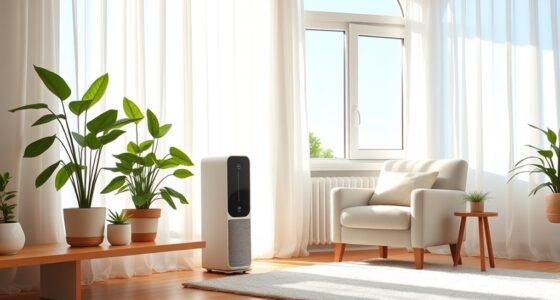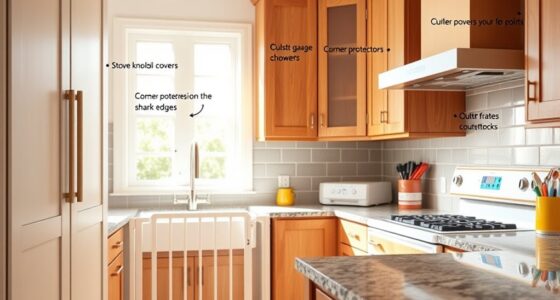HEPA filters capture airborne particles through mechanical filtration, trapping contaminants in dense fibers as air flows through. They are highly effective at removing dust, pollen, pet dander, mold spores, and bacteria as small as 0.3 microns with 99.97% efficiency. However, they don’t sterilize germs or eliminate odors and need proper maintenance to stay effective. To learn more about how to get the most from your filter, keep exploring the details below.
Key Takeaways
- HEPA filters mechanically trap airborne particles, including bacteria, pollen, dust mites, and smoke, with 99.97% efficiency for particles as small as 0.3 microns.
- They do not neutralize germs or sterilize air; their primary function is capturing particles, not killing or neutralizing microorganisms.
- Proper maintenance and timely filter replacement are essential to prevent clogging, maintain airflow, and ensure optimal particle removal.
- HEPA filters are less effective at removing odors, gases, and chemical vapors, which require activated carbon filters for better performance.
- They can restrict airflow if not properly installed or maintained, so correct installation and routine checks are vital for effective filtration.
How HEPA Filters Capture Particles
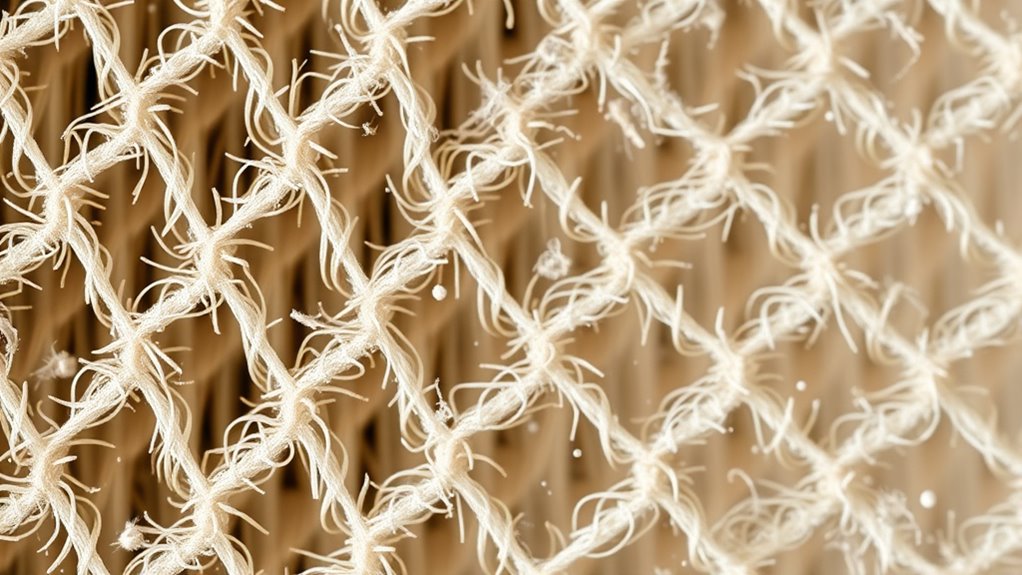
HEPA filters capture particles through a process known as mechanical filtration, where the air passes through a dense fibrous material that traps contaminants. The way air moves—air flow dynamics—ensures particles collide with fibers and become trapped. Proper filter maintenance is essential because over time, dust and debris can clog the fibers, reducing efficiency and restricting airflow. When filters are clean, air flows smoothly through the material, maximizing particle capture. If you neglect regular replacement or cleaning, airflow slows, and fewer particles are caught, diminishing the filter’s effectiveness. Understanding how air flow interacts with the filter helps you maintain peak performance, ensuring that your HEPA filter continues to trap harmful particles effectively and keeps your environment healthier. Additionally, incorporating field recording techniques can help optimize the design of filtration systems for better airflow management.
Types of Particles a HEPA Filter Can Trap
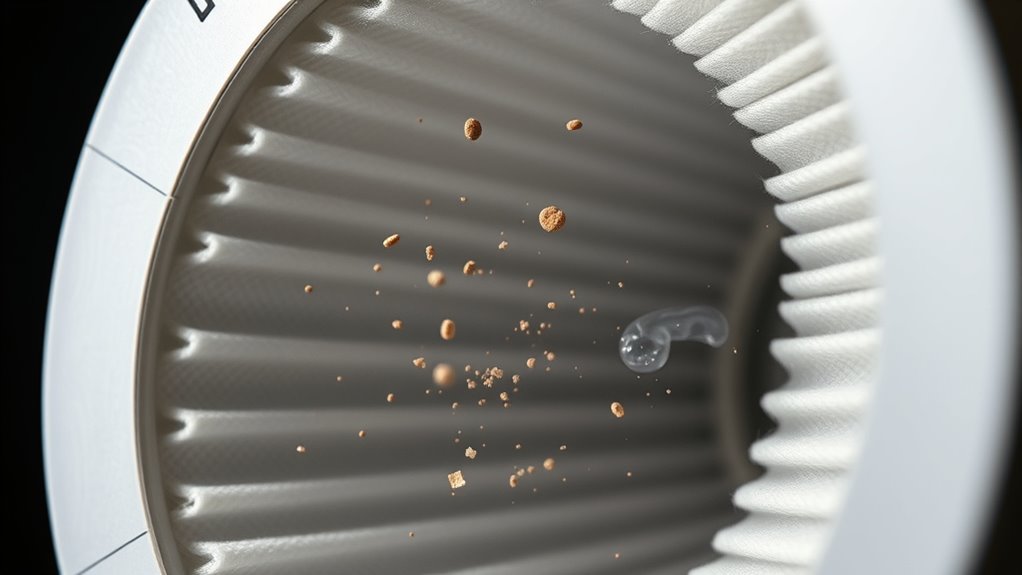
Have you ever wondered what kinds of particles a HEPA filter can effectively trap? HEPA filters are designed to capture a wide range of microscopic particles that can impact your health. They excel at trapping airborne bacteria, preventing them from circulating in your indoor air. Additionally, HEPA filters are highly effective at pollen removal, reducing allergens that trigger allergies or asthma. These filters can trap particles as small as 0.3 microns with 99.97% efficiency, which includes dust mites, pet dander, mold spores, and smoke particles. By targeting these tiny particles, HEPA filters help improve indoor air quality and create a healthier environment. Keep in mind, though, that while they trap many harmful particles, some larger particles may pass through or settle on the filter surface. Understanding HEPA filter capabilities can help you make informed decisions about air purification.
Limitations and Common Misunderstandings

Although HEPA filters are highly effective at trapping small particles, they do have limitations that users should understand. One key factor is their filter lifespan; over time, filters become clogged, reducing efficiency and requiring replacement. Neglecting timely changes can lead to decreased air quality. Additionally, installation challenges can arise, especially with older HVAC systems or non-standard units, making proper setup difficult. Misunderstandings also persist, such as believing HEPA filters eliminate all airborne contaminants or that they neutralize germs completely; in reality, they mainly trap particles and don’t sterilize the air. Recognizing these limitations helps you use HEPA filters effectively, ensuring you maintain good indoor air quality without overestimating their capabilities. Regular maintenance and understanding the filter capacity are essential for optimal performance.
Comparing HEPA Filters to Other Air Purification Technologies
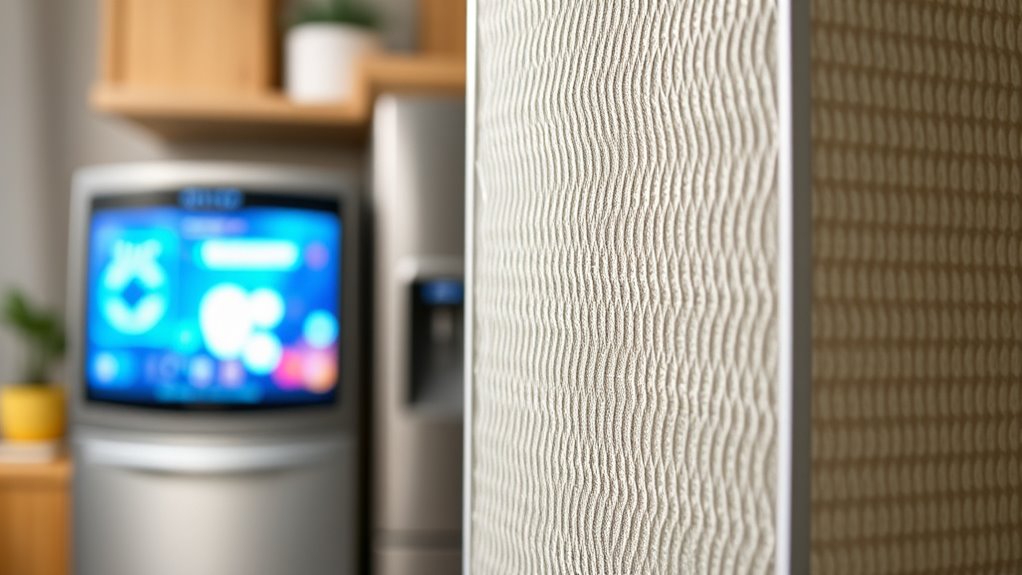
When comparing HEPA filters to other air purification technologies, it’s important to understand their distinct strengths and limitations. HEPA filters excel at capturing tiny particles due to their dense filter media but may restrict air flow dynamics if not properly maintained. Alternative technologies like activated carbon remove odors and gases but don’t trap particles as effectively. UV purifiers can neutralize microorganisms but don’t filter airborne debris. Here’s a comparison:
| Technology | Strengths | Limitations |
|---|---|---|
| HEPA Filters | Particle removal, high efficiency | Filter maintenance needed, airflow restriction |
| Activated Carbon | Odor & gas removal | Less effective against particles |
| UV Purifiers | Microorganism neutralization | No particle filtration, requires maintenance |
| Ionic Purifiers | Low airflow resistance | Can produce ozone, less effective in particle removal |
Additionally, proper maintenance of HEPA filters is essential to ensure they continue to operate at peak performance.
Tips for Maximizing the Effectiveness of Your HEPA Filter
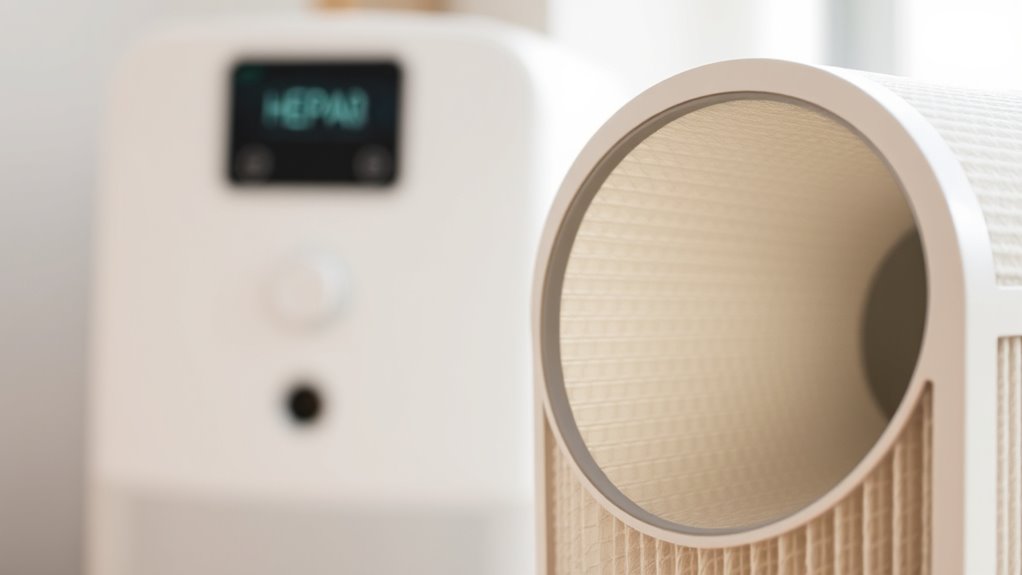
To get the most out of your HEPA filter, proper maintenance and installation are key. Regular maintenance tips, like replacing or cleaning pre-filters and checking for blockages, help ensure peak performance. Keep your filter’s lifespan in mind by adhering to manufacturer recommendations; a filter that’s overdue for replacement won’t effectively trap airborne particles. Ensure your device is installed correctly, with seals tight and airflow unobstructed, to maximize filtration efficiency. Avoid forcing filters into place or modifying them, as improper installation can reduce their effectiveness. Monitoring air quality and scheduling routine filter replacements will prolong the lifespan of your HEPA filter and maintain a healthy environment. Consistent upkeep guarantees your filter performs at its best, providing cleaner, safer air. Silky tantrums often occur during family photoshoots, adding humor to the experience.
Frequently Asked Questions
Can HEPA Filters Remove Gases and Odors Effectively?
HEPA filters don’t effectively remove gases and odors on their own because they mainly trap particles. For gas absorption and odor control, you need activated carbon or charcoal filters, which specialize in absorbing gases and neutralizing odors. When combined with HEPA filters, these systems provide thorough air cleaning, tackling both airborne particles and unwanted smells effectively. So, if odor removal is your goal, add a carbon filter to your setup.
How Often Should I Replace My HEPA Filter?
You should replace your HEPA filter every 6 to 12 months, depending on its filter lifespan and usage. Keep an eye on replacement indicators like decreased airflow or increased odors. If your air purifier has a filter change alert, follow it closely. Regular replacements guarantee peak filtration, helping you maintain cleaner air and better indoor air quality. Don’t delay replacing the filter when needed to keep your system working effectively.
Are HEPA Filters Safe for People With Allergies?
Your allergies will thank you, because HEPA filters are incredibly safe for allergy relief. They effectively trap tiny particles like pollen, pet dander, and dust mites, reducing your allergy symptoms. Filter safety is high, and they’re widely recommended for allergy sufferers. Just remember to replace your filter regularly to keep it working at its best. With a HEPA filter, you’re creating a safer, healthier environment for yourself every day.
Do HEPA Filters Work in Humid or Damp Environments?
HEPA filters can work in humid or damp environments, but humidity concerns may affect their filter durability. Excess moisture can cause mold growth on the filter or reduce its efficiency over time. To keep your filter working well, make sure your space isn’t overly damp and replace the filter regularly. Proper maintenance helps prevent moisture-related issues, so your HEPA filter continues to effectively trap allergens and particles.
Can HEPA Filters Eliminate Viruses and Bacteria Completely?
Imagine a tiny fortress, fighting off airborne threats, but it can’t guarantee complete victory against all viruses and bacteria. HEPA filters considerably reduce viral transmission and bacteria, capturing particles as small as 0.3 microns. However, they don’t eliminate every pathogen entirely. You still need other precautions, like masks and good hygiene, because some viruses and bacteria can slip through or settle beyond the filter’s reach, keeping you slightly vulnerable.
Conclusion
Think of HEPA filters as your air’s vigilant guardians, silently catching the tiniest invaders. While they’re powerful allies against dust, pollen, and bacteria, they’re not magic shields against every airborne threat. To keep your air fresh and your home safe, use your HEPA filter wisely and understand its limits. When you do, it’s like turning your space into a well-guarded fortress—clean, clear, and ready to breathe easy.



